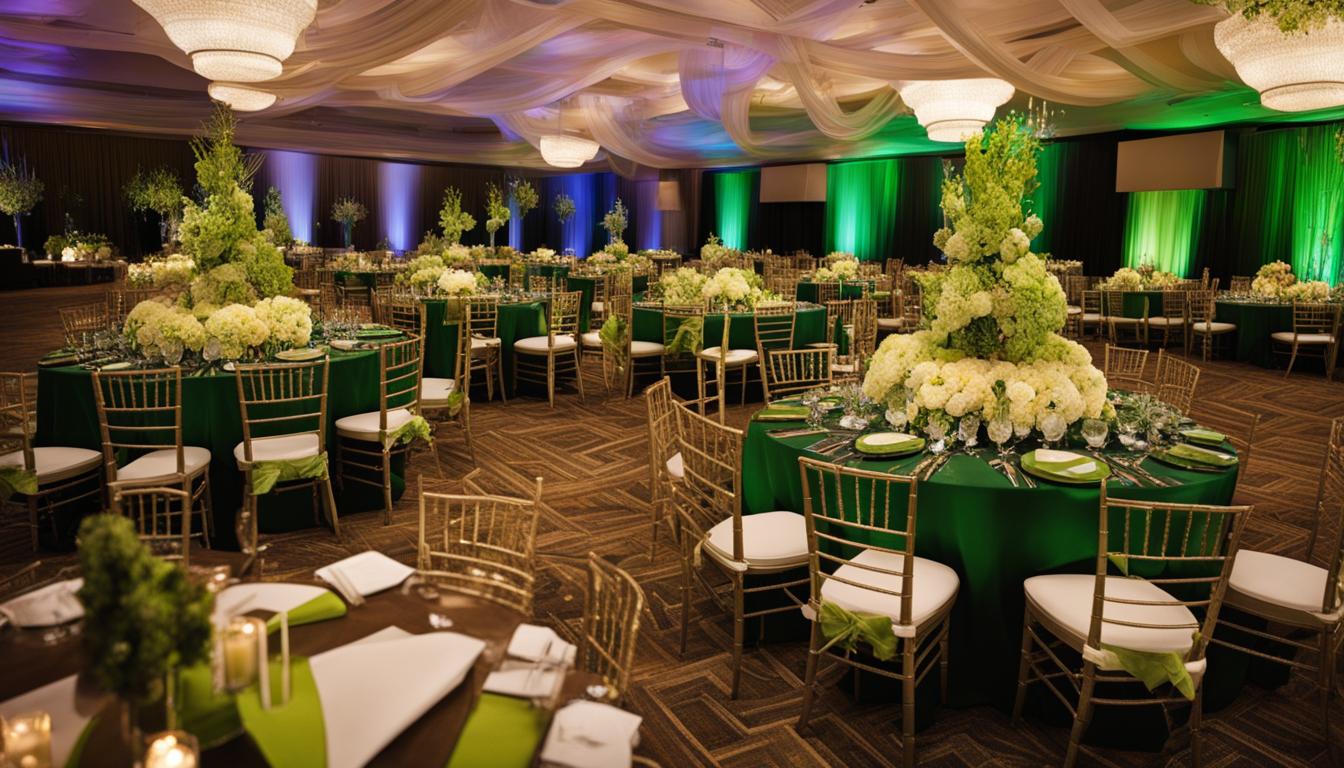Planning to venture into the wedding venue business? You’re in the right place! As a seasoned expert in the industry, I’m here to shed light on the costs involved in starting a wedding venue and provide insights into the financial aspects of this exciting venture.
Before diving into the specifics, it’s essential to understand that starting a wedding venue requires careful consideration of various factors, including budgeting, investment, financing, pricing, and overall business expenses. Let’s explore these aspects in detail to help you make informed decisions.
Key Takeaways:
- Starting a wedding venue involves financial planning and analysis.
- Consider budgeting, investment, financing, pricing, and overall business expenses.
- Understanding the costs will help you make informed decisions.
- Take into account various factors such as space requirements and revenue potentials.
- Ensure profitability by managing hidden costs, reinvesting profits, and planning for sustainability.
Average Wedding Size and Types of Wedding Venues
When it comes to planning a wedding, couples have different preferences for the size and style of their special day. Understanding the average wedding size and the types of wedding venues available can help couples find the perfect setting for their celebration.
In 2021, the average wedding size was 105 guests, a decrease from the 131 guests reported in 2019. This shift may be influenced by various factors, including the ongoing pandemic and couples’ desire for more intimate gatherings. However, it’s important to note that wedding sizes can still vary significantly depending on cultural traditions, personal preferences, and geographical location.
Wedding venues come in various types, each offering its own unique atmosphere and charm. Some of the most popular types include:
- Ballroom Wedding Venue: Elegant and grand, ballroom venues are ideal for formal and glamorous weddings.
- Church Wedding Venue: For couples seeking a traditional and religious ceremony, a church venue provides a sacred and reverent setting.
- Barn Wedding Venue: Rustic and charming, barn venues offer a countryside ambiance perfect for rustic and vintage-themed weddings.
- Historic Home Wedding Venue: Couples who appreciate history and timeless elegance may opt for a historic home venue, which often features beautiful architecture and picturesque gardens.
- Country Club Wedding Venue: With manicured grounds and exclusive amenities, country club venues offer a luxurious setting for weddings.
- Hotel Wedding Venue: Hotels are a popular choice for couples who want the convenience of accommodations and event spaces in one location.
- Waterfront Wedding Venue: For those who dream of saying “I do” with a breathtaking view of the water, waterfront venues provide a serene and picturesque backdrop.
These are just a few examples of the types of wedding venues available, and each offers its own unique ambiance and features. Couples should consider their wedding vision, guest count, and desired atmosphere when selecting a venue that suits their preferences.
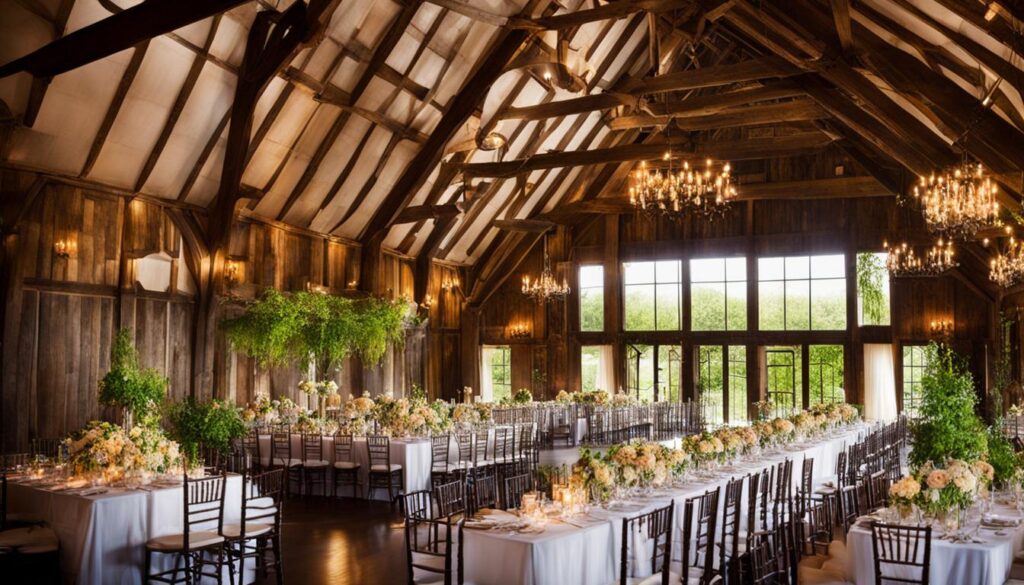
Cost of Building a Wedding Venue and Space Requirements
Building a wedding venue involves significant costs and careful consideration of space requirements. The cost of constructing a wedding venue can range between $750,000 and $1,000,000, depending on the size and amenities. It is essential to assess the specific needs of the venue, including space for the wedding ceremony, reception, and dance floor.
One popular option for wedding venues is converting a barn into a unique and rustic event space. The cost of refurbishing an old barn can range from $360,000 to $1,000,000, depending on the extent of renovations required. Building a new barn from scratch may also incur similar costs.
Parking space requirements should also be taken into account when estimating the overall cost of a wedding venue. The number of parking spaces needed will depend on the venue’s capacity and local regulations. It is advisable to allocate adequate space and consider the cost of paving a parking lot if necessary.
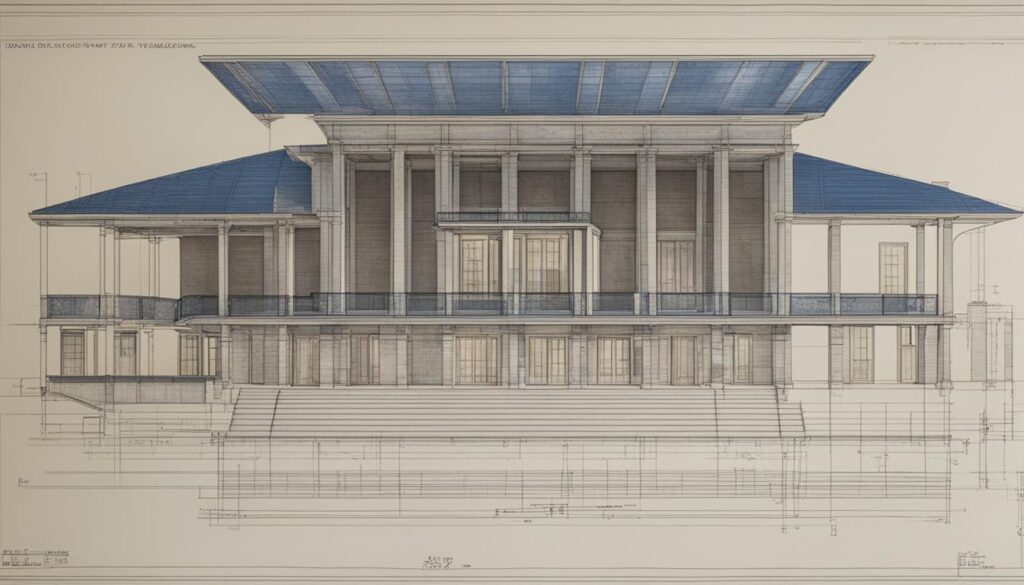
Table: Space Requirements for a Wedding Venue
| Space | Minimum Requirement |
|---|---|
| Wedding Ceremony Space | Approximately 100 square feet per guest |
| Wedding Reception Space | Approximately 10 square feet per guest |
| Dance Floor Space | Approximately 2 to 4 square feet per guest |
| Parking Space | Varies based on venue capacity |
Aspiring wedding venue owners should carefully assess the cost of building a venue, including refurbishing or constructing a barn, as well as the space requirements for hosting weddings. It is crucial to accurately estimate these costs to create a viable business plan and ensure the venue can meet the demands of future couples and provide unforgettable experiences.
Wedding Venue Annual Revenue and Expenses
When it comes to running a wedding venue, understanding the financial aspects is crucial. Let’s take a closer look at the annual revenue and expenses that are typically associated with operating a wedding venue.
Wedding venue annual revenue can vary depending on factors such as location, reputation, and capacity. On average, a wedding venue in the United States generates approximately $467,000 in annual revenue. This revenue is primarily generated through hosting weddings and events throughout the year.
Wedding venue prices also play a significant role in determining the annual revenue. Prices can range from $3,000 to $11,000 per wedding, with an average cost of around $6,000. Venues typically host an average of 50 weddings per year, which amounts to a total of 217 events per year, including other non-wedding events.
Operating a wedding venue also incurs various expenses. These expenses include advertising costs to reach potential couples, bookkeeping and administrative expenses, cleaning and maintenance costs, rent or mortgage payments for the venue space, staffing costs, equipment and supplies, insurance, and utilities. It’s important to carefully manage these expenses to ensure profitability and sustainability.
| Expense | Estimated Cost |
|---|---|
| Advertising | $5,000 – $10,000 per year |
| Bookkeeping and Administrative | $2,000 – $5,000 per year |
| Cleaning and Maintenance | $3,000 – $6,000 per year |
| Rent or Mortgage Payments | $4,000 – $10,000 per month |
| Staffing Costs | $50,000 – $100,000 per year |
| Equipment and Supplies | $10,000 – $20,000 per year |
| Insurance | $5,000 – $10,000 per year |
| Utilities | $8,000 – $15,000 per year |
Managing wedding venue revenue and expenses requires careful planning and monitoring to ensure a profitable and successful business. By understanding these financial aspects, venue owners can make informed decisions to optimize revenue while effectively managing expenses.
Wedding Venue Profitability and Gross Profit Margin
When considering the profitability of a wedding venue, it’s essential to analyze the profit margin and gross profit margin. These financial metrics provide valuable insights into the venue’s financial performance and efficiency. Let’s take a closer look at what these terms mean and how they impact a wedding venue’s profitability.
Profit Margin and Gross Profit Margin Explained
The profit margin is a measure of how much profit a business generates relative to its revenue. In the case of a wedding venue, it represents the percentage of revenue that remains as profit after deducting all expenses. A high profit margin indicates that a venue is effectively managing its costs and generating a healthy profit.
The gross profit margin, on the other hand, focuses specifically on the revenue generated from hosting weddings. It measures the percentage of revenue left after deducting the direct costs associated with providing wedding services, such as catering, decorations, and rentals. A high gross profit margin suggests that a venue is pricing its services appropriately and effectively managing its cost of goods sold.
The Importance of Profitability and Gross Profit Margin
Profitability is crucial for the long-term success of a wedding venue. It allows the venue to cover its operating expenses, invest in improvements and upgrades, and provide excellent service to couples. By analyzing the profit margin and gross profit margin, venue owners can identify areas where they can reduce costs, improve efficiencies, and maximize profitability.
| Profit Margin | Gross Profit Margin | |
|---|---|---|
| Average Range | 10% – 30% | 30% – 60% |
| Key Considerations | Achieving high profit margins requires careful cost management and efficient operations. | Venues should price their services to cover direct costs and generate a healthy profit. |
It’s important to note that profitability in the wedding venue industry can vary depending on several factors, such as location, market demand, competition, and operating expenses. While some venues may achieve profit margins at the higher end of the range, others may face challenges that impact their profitability. It’s crucial for venue owners to continuously assess their financial performance, adjust their strategies, and ensure they are operating in a financially sustainable manner.
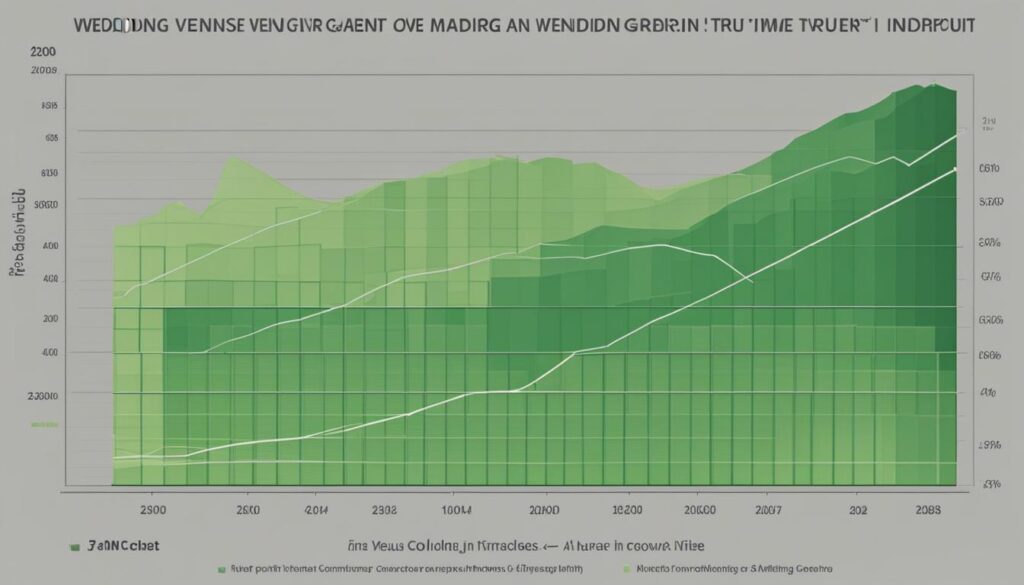
Understanding the profit margin and gross profit margin is vital for the financial success of a wedding venue. By analyzing these metrics and making informed decisions, venue owners can optimize their profitability and create a thriving business that provides unforgettable experiences for couples on their special day.
Hidden Costs of Building a Wedding Venue
When it comes to building a wedding venue, there are several hidden costs that can catch entrepreneurs by surprise. These expenses can add up quickly and significantly impact the overall budget of the project. It is essential to consider these costs upfront and ensure they are factored into the financial planning process to avoid any unexpected financial hurdles along the way.
One of the hidden costs of building a wedding venue is the installation of fire suppression systems. These systems are crucial for ensuring the safety of guests and meeting local building codes and regulations. The cost of implementing fire suppression can vary depending on the size of the venue and the complexity of the system.
Another hidden cost to consider is the expense of extending utilities to the wedding venue site. This includes connecting to electricity, water, and sewage lines. The distance from existing utility connections and the need for any additional infrastructure can significantly impact the overall cost.
Additionally, building a commercial parking lot is another expense that may be overlooked. Providing adequate parking for guests is essential, and in some cases, a venue owner may need to construct a parking lot from scratch. This can involve additional costs such as land acquisition, grading, paving, and landscaping.
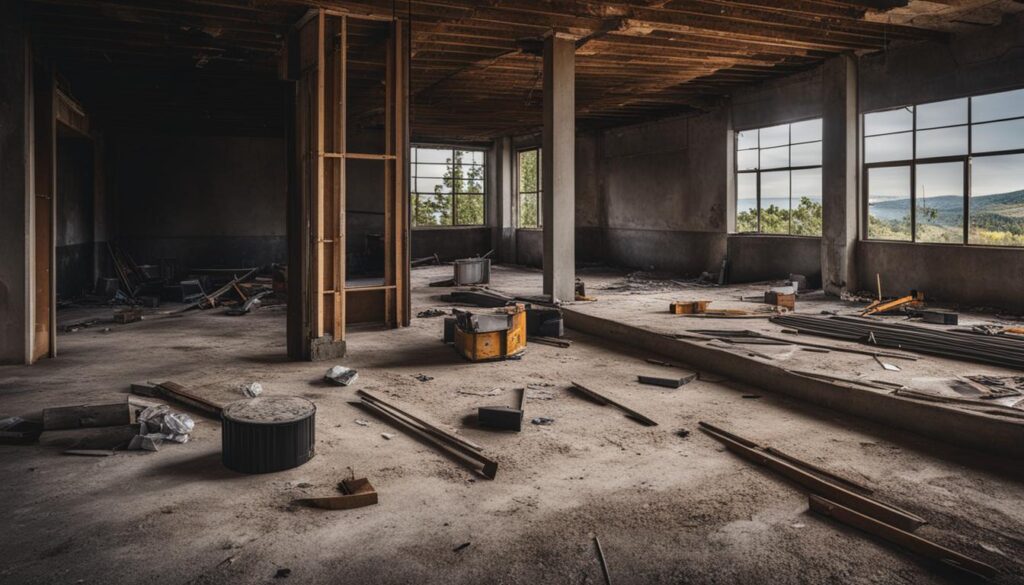
Table: Hidden Costs of Building a Wedding Venue
| Hidden Costs | Brief Description |
|---|---|
| Fire Suppression | Cost of installing fire suppression systems to meet safety regulations. |
| Utility Extensions | Expenses associated with extending electricity, water, and sewage lines to the venue site. |
| Commercial Parking Lot | The cost of constructing a parking lot to accommodate guests’ vehicles. |
| Traffic Generation Fee | Some municipalities require a fee to mitigate traffic impact from the venue. |
| Legal Fees | Costs for permits, zoning, and legal consultation during the building process. |
| Building Upgrades | Unforeseen expenses for unexpected building upgrades or modifications. |
| Marketing | Investment in marketing activities to promote the wedding venue to potential clients. |
In addition to the hidden costs mentioned above, venue owners must also consider traffic generation fees, legal fees for permits and zoning, unexpected building upgrades, and marketing expenses. These costs can vary depending on the location and specific requirements of the venue. It is crucial to conduct thorough research and consult with professionals to ensure all hidden costs are accounted for in the budgeting process.
By understanding and preparing for these hidden costs, entrepreneurs can better plan their finances and avoid any surprises during the construction and operation of their wedding venue. Proper financial planning and budgeting ensure that the venue can thrive and provide an exceptional experience for couples and their guests.
Profitability and Financial Considerations for Wedding Venues
When it comes to the profitability of wedding venues, there are several factors that venue owners need to consider. While owning a wedding venue can be a lucrative business, it often comes with its own set of challenges and financial considerations.
One of the common issues that venue owners face is working for free, especially in the early stages of the business. Start-up costs can be substantial, including the cost of building or renovating the venue, purchasing equipment and furniture, and marketing the business. These expenses can take a toll on profitability, and it may take time before the venue starts generating enough revenue to cover these costs and provide a return on investment.
Debt can also have a significant impact on the profitability of a wedding venue. Many venue owners rely on loans or financing to cover the high start-up costs, and the interest and repayment obligations can eat into profits. It is essential for venue owners to carefully manage their debt and have a solid plan for generating enough revenue to cover these obligations.
High fixed costs
Wedding venues often have high fixed costs that need to be considered when calculating profitability. These costs include rent or mortgage payments, utilities, insurance, property taxes, and staff salaries. Even during slow seasons or periods with fewer bookings, these fixed costs need to be paid, which can put pressure on the venue’s financial stability.
Reinvesting profits is another important consideration for venue owners. It is common for venue owners to reinvest a significant portion of their profits back into the business to improve and upgrade facilities, invest in marketing and advertising, and provide exceptional service to attract more couples. While this can help the venue grow and increase its profitability in the long run, it means that owners may not take home as much profit in the short term.
Lastly, saving for sustainability is crucial for the long-term success of a wedding venue business. Economic conditions and market demands can change, and having cash reserves can help the venue weather any downturns or unexpected challenges. By saving for sustainability, venue owners can ensure that their business remains profitable and continues to thrive in the highly competitive wedding industry.
Conclusion
Owning a wedding venue can be a profitable business, but it requires careful financial planning, cost analysis, and a focus on providing excellent service. While there are challenges and hidden costs in building and operating a venue, profitability is possible with the right strategies and market demand.
When starting a wedding venue, it’s essential to consider the costs involved in building the space and meeting the specific requirements for ceremonies, receptions, and dance floors. Understanding the average wedding size and the different types of venues can help you cater to the needs and preferences of your target audience.
Managing the annual revenue and expenses of your wedding venue is crucial for financial success. This includes setting competitive prices, attracting a steady stream of events, and carefully monitoring and controlling expenses such as advertising, staff wages, and insurance.
While the wedding venue industry can be challenging, maintaining a healthy profit margin is possible. By understanding the cost of goods sold and reinvesting profits wisely, you can ensure the long-term sustainability and profitability of your business. Remember, providing exceptional service and staying attuned to market demand are key to thriving in this industry.
FAQ
How much does it cost to start a wedding venue?
Building a wedding venue can cost between $750,000 and $1,000,000, depending on capacity and amenities.
What is the average wedding size and what types of wedding venues are available?
The average wedding size in 2021 was 105 guests. Wedding venues can cater to different types of weddings, such as ballroom, church, barn, historic home, country club, hotel, and waterfront venues.
What are the space requirements for a wedding venue?
Space requirements include areas for the ceremony, reception, and dance floor.
How much does it cost to build a barn wedding venue?
Costs for a barn wedding venue range from $360,000 to refurbish an old barn to $1,000,000 to build a new one.
What are the average revenue and expenses of a wedding venue?
The average wedding venue in the United States generates approximately $467,000 in annual revenue. Common expenses for wedding venues include advertising, bookkeeping, cleaning, rent, staffing costs, equipment and supplies, insurance, and utilities.
What are the profit margin and gross profit margin for wedding venues?
Wedding venues can expect net profit margins between 10% and 30%, and the gross profit margin should be between 30% and 60%.
What are the hidden costs of building a wedding venue?
Hidden costs can include fire suppression systems, extending utilities, constructing a commercial parking lot, paying traffic generation fees, legal fees for permits and zoning, unexpected building upgrades, and marketing expenses.
What are the financial considerations for wedding venues?
Many wedding venues are barely breaking even or losing money due to high start-up costs, debt burdens, and high fixed costs. Venue owners often reinvest a significant portion of their profits back into the business. It is crucial to have cash reserves and plan for sustainability in a potentially changing market.
Source Links
- https://www.projectionhub.com/post/how-to-start-a-wedding-venue
- https://kristinbinford.com/blog/building-wedding-venue-costs
- https://kristinbinford.com/blog/wedding-venues-profitable-salary

